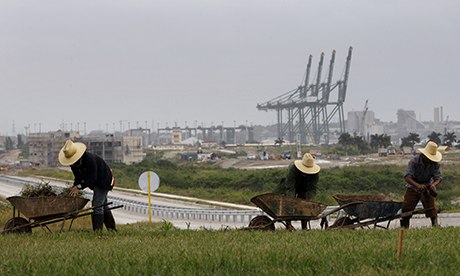
Cuba economic reforms a signal for Obama
Dewayne Wickham
You’ve got to wonder whether anyone in the Obama administration hears the pinging of Cuba’s economic reforms.
The most recent sound came on Saturday, when its national assembly adopted a measure that moves the communist country closer to the mainstream of international business. This new law offers major financial incentives for foreign businesses to enter into joint ventures with Cuban companies and, for the first time, permits foreign investors to own up to 100% of a businesson the embattled Caribbean island. This new law also exempts most investors from paying a tax on their profits for eight years.
These pinging sounds started shortly after Raul Castro succeeded his brother, Fidel, as president in 2008. Since taking office, Raul Castro has overseen reforms that increased economic opportunities for Cubans by expanding private ownership of businesses, permitting the sale of homes and cars among Cubans, and by eliminating the need for Cubans who want to travel abroad to get an exit visa. He has also made it easier (though not less costly) for Cubans to own smartphones and access the Internet.
Sure, the big hurdle that many Cubans can’t scale is the price tag of these things. Their salaries still lag far behind the cost of the new freedoms. The pessimist would say these reforms are the free-market window dressing of an unyielding communist system. But the optimist might argue that Cuba has started down a path from which there is no retreat, forcing the government ultimately to boost the buying power of its people.
I think the pinging sounds coming out of Havana these past few years indicate that the communist state is undergoing a dramatic change – one that the Obama administration ought to encourage. In fact, Cuba could use a lot of encouragement. Too many of the country’s aging leaders have a bunker mentality. Their memories of the USA’s many schemes to topple Fidel Castro are vivid. Their confidence in this country’s sincerity in saying it wants to improve relations with is Cuba is awful low.
As the president of the protagonist nation in the long-running rift between the U.S. and Cuba, Barack Obama inherits the responsibility to initiate a sincere effort to bring this lingering standoff to an end. Just as he ended U.S. involvement in Iraq and shut down America’s longest war in Afghanistan, Obama should be just as aggressive in seeking to halt this nation’s longest Cold War conflict.
Anyone who knows the bloody costs China made American forces pay in the Korean War, or that the Vietnamese exacted from U.S. troops in the Vietnam War, should understand this nation’s ability to overcome the divisions such warring among nations create.
If this nation could mend its wounds with Vietnam and China – two communist countries with which the United States now has normal diplomatic and economic relations – it ought to be able to make peace with Cuba.
At stake here is not just the lives of 11 million Cubans, who are hostages of the financial blockade that was imposed to undermine their country’s economy, but also the legitimacy of our nation’s claim to moral leadership.
The Obama administration can’t expect to rally worldwide support for its condemnation of Russia’s intrusion into the affairs of Ukraine while it continues this nation’s effort to destroy Cuba’s economy. It can argue its reasons for doing so, but it will not escape the label of hypocrite.
Instead, President Obama should accept the pinging sounds of economic reform coming out of Havana as the opening he needs to end this country’s attempt to topple Cuba’s government.
(From USA Today)

